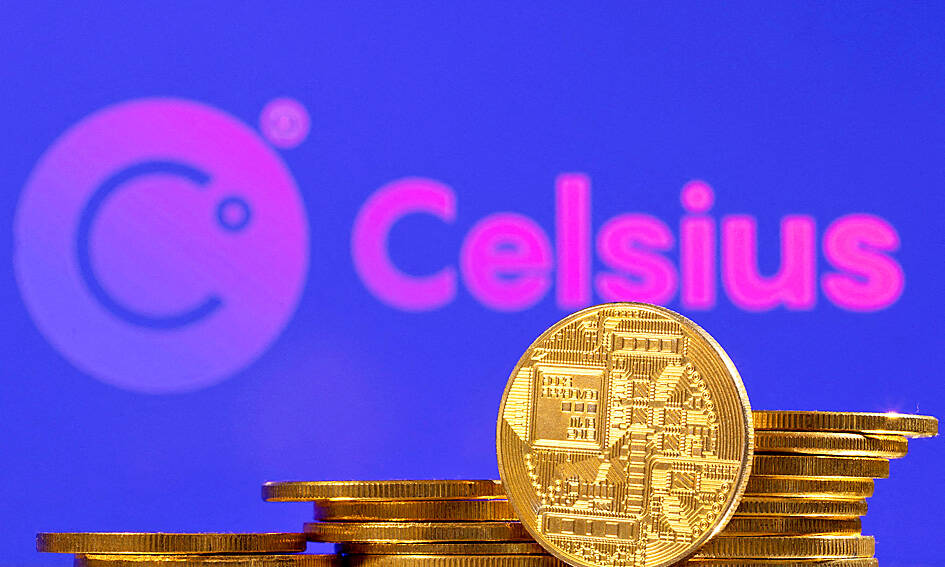US regulators are prying deep into the remnants of failed hedge fund Three Arrows Capital Pte Ltd (3AC, 三箭資本) as they try to untangle the fallout of this year’s crypto crash.
Three Arrows, which until recently was one of the industry’s most prominent firms, filed for bankruptcy in July after the broad sell-off in digital assets spurred in part by the collapse of the terra blockchain.
The US Commodity Futures Trading Commission (CFTC) and the US Securities and Exchange Commission (SEC) are looking into whether the money manager breached rules by misleading investors about the strength of its balance sheet and not registering with the agencies, two people familiar with the matter said.

Photo: Reuters
Scrutiny from the agencies, both of which declined to comment, can lead to monetary fines and other penalties for firms and individuals.
At its zenith, Three Arrows counted a few billion dollars under management, making it a major player in the crypto world. Known for its bullish stance, it was also a recipient of loans from firms across the industry, and was a venture investor in some of the industry’s best-known start-ups.
However, the firm sustained losses on its position in the terra blockchain project, which came crashing down as the so-called algorithmic stablecoin terraUSD crumbled in May.
As the token’s collapse spread across the broader crypto market over the following weeks, Three Arrows was unable to meet margin calls from its lenders and eventually declared insolvency.
Liquidators overseeing the wind-down of the firm, which operated from Singapore until at least early May, have seized control of tens of millions of dollars of the fund’s assets.
However, that is a fraction of the billions of dollars that creditors, including bankrupt crypto lenders Voyager Digital and Celsius Network, said they were owed.
Teneo, the court appointed liquidator, has claimed that Three Arrows’ founders have not fully cooperated with the unwinding.
They took the unusual step of asking a US judge for permission to serve founders Zhu Su (蘇朱) and Kyle Davies with subpoenas through their Twitter accounts and e-mail addresses, because normal methods have failed, court documents filed last week showed.
Celsius Network LLC is also facing scrutiny from US regulators. Lawyers for the firm this month disclosed that it had received a federal grand jury subpoena from the US District Court for the Southern District of New York, as well as inquiries from the CFTC, the SEC and the US Federal Trade Commission.
The CFTC is investigating if Celsius failed to disclose how customers’ funds were used and if some of its conduct amounted to market manipulation, a person familiar with the matter said.
Although the CFTC’s jurisdiction over crypto is generally limited to derivatives, the agency can take enforcement action if it believes there is fraud or manipulation in the underlying market. The SEC claims oversight over digital coins that qualify as securities under its rules. Both regulators also oversee investment firms.

Hon Hai Precision Industry Co (鴻海精密) yesterday said that its research institute has launched its first advanced artificial intelligence (AI) large language model (LLM) using traditional Chinese, with technology assistance from Nvidia Corp. Hon Hai, also known as Foxconn Technology Group (富士康科技集團), said the LLM, FoxBrain, is expected to improve its data analysis capabilities for smart manufacturing, and electric vehicle and smart city development. An LLM is a type of AI trained on vast amounts of text data and uses deep learning techniques, particularly neural networks, to process and generate language. They are essential for building and improving AI-powered servers. Nvidia provided assistance

DOMESTIC SUPPLY: The probe comes as Donald Trump has called for the repeal of the US$52.7 billion CHIPS and Science Act, which the US Congress passed in 2022 The Office of the US Trade Representative is to hold a hearing tomorrow into older Chinese-made “legacy” semiconductors that could heap more US tariffs on chips from China that power everyday goods from cars to washing machines to telecoms equipment. The probe, which began during former US president Joe Biden’s tenure in December last year, aims to protect US and other semiconductor producers from China’s massive state-driven buildup of domestic chip supply. A 50 percent US tariff on Chinese semiconductors began on Jan. 1. Legacy chips use older manufacturing processes introduced more than a decade ago and are often far simpler than

STILL HOPEFUL: Delayed payment of NT$5.35 billion from an Indian server client sent its earnings plunging last year, but the firm expects a gradual pickup ahead Asustek Computer Inc (華碩), the world’s No. 5 PC vendor, yesterday reported an 87 percent slump in net profit for last year, dragged by a massive overdue payment from an Indian cloud service provider. The Indian customer has delayed payment totaling NT$5.35 billion (US$162.7 million), Asustek chief financial officer Nick Wu (吳長榮) told an online earnings conference. Asustek shipped servers to India between April and June last year. The customer told Asustek that it is launching multiple fundraising projects and expected to repay the debt in the short term, Wu said. The Indian customer accounted for less than 10 percent to Asustek’s

Gasoline and diesel prices this week are to decrease NT$0.5 and NT$1 per liter respectively as international crude prices continued to fall last week, CPC Corp, Taiwan (CPC, 台灣中油) and Formosa Petrochemical Corp (台塑石化) said yesterday. Effective today, gasoline prices at CPC and Formosa stations are to decrease to NT$29.2, NT$30.7 and NT$32.7 per liter for 92, 95 and 98-octane unleaded gasoline respectively, while premium diesel is to cost NT$27.9 per liter at CPC stations and NT$27.7 at Formosa pumps, the companies said in separate statements. Global crude oil prices dropped last week after the eight OPEC+ members said they would